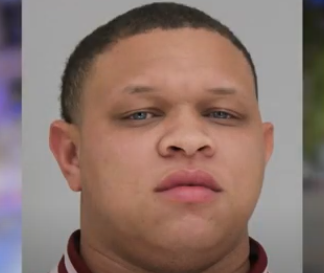In a Dallas courtroom, the fate of a man accused of murder took a significant turn when the judge denied his request for a bond reduction. The man, Kendrick Finch, who is charged with the shooting and killing of 28-year-old Ashley Long, appeared for his bond hearing on Wednesday. Despite the defense’s argument and the dramatic circumstances surrounding the case, the judge maintained the $500,000 bond, rejecting any reduction.

The Incident that Led to the Murder Charge
The shooting incident occurred on the evening of April 5th, when Ashley Long, a Houston-area real estate agent, was tragically killed in downtown Dallas. According to police reports and the arrest affidavit, Finch shot Long after an altercation that escalated quickly between the individuals involved. The conflict began when a man, who was accompanying Long, allegedly brushed his hand along the passenger side of a passing Mercedes. This seemingly minor interaction sparked a deadly confrontation.
The situation rapidly escalated as Finch, who was in his vehicle at the time, exited with a firearm. Surveillance footage played in the courtroom showed that as Finch stepped out, the man accompanying Long also drew a gun from her purse. This is when the shots were fired, leading to the fatal injury of Long.
Legal Arguments: Self-Defense or Unjustified Killing?
Finch’s attorney presented a defense arguing that the shooting was a case of self-defense. The defense contended that the video clearly indicated who had initiated the conflict and who was approaching Finch’s vehicle. According to the defense team, Finch had every right to defend himself under the law, suggesting that his actions were in response to a perceived threat.
However, the prosecution painted a different picture. They contended that the evidence did not support Finch’s claim of self-defense and that his decision to shoot Long was a clear overreaction. The tension between the two versions of the story was palpable as the legal teams presented their respective arguments.
The Impact on Long’s Family
Long’s family was visibly affected by the proceedings. Though they chose not to speak to the media during the bond hearing, they had previously shared their grief with the press. In late April, they opened up about their loss, describing Long as a dedicated professional who had been in Dallas for a networking trip. Long had been enjoying a night out on the town when she found herself in the wrong place at the wrong time, and this tragic event ultimately ended her life.
The emotional toll of the situation weighed heavily on Long’s family, who have now become central figures in the public aspect of this case. They had to confront the grim reality of losing a loved one in such a senseless and violent manner. The pain they expressed in their statements underscored the gravity of the incident and the emotional complexity of the legal proceedings that followed.
The Court’s Decision and Its Implications
As the hearing progressed, it became clear that the court was not swayed by the defense’s arguments. Judge’s decision to uphold the $500,000 bond reflected the serious nature of the charges against Finch. The prosecution’s case, bolstered by the surveillance footage and the testimonies presented, left little room for leniency at this stage.
The decision also indicated that Finch’s actions on that fateful night would be closely scrutinized in court. His defense of self-defense may be challenged further, and as the case moves to trial, the questions surrounding the justification for his actions will likely take center stage.
Looking Ahead: What’s Next in the Case?
As the legal battle continues, both sides will have their opportunities to present their cases in full. The prosecution will attempt to prove that Finch’s actions were not justified, while the defense will maintain that his response was one of self-preservation. This conflict between self-defense and unlawful killing will be a key point of contention as the trial progresses.
The emotional strain on Long’s family, as they prepare for the trial, will likely remain a poignant part of the case. The trial will provide a deeper look into the circumstances surrounding Long’s death and the actions of Kendrick Finch. While the legal process is set to unfold in the coming months, the echoes of that tragic night will undoubtedly linger in the lives of those affected by the incident.
In the meantime, the case serves as a reminder of the volatile nature of confrontations and the extreme consequences that can result from what might seem like a minor disagreement. The ongoing legal proceedings will shed light on the broader implications of the use of firearms in public spaces and the legal limits of self-defense.






